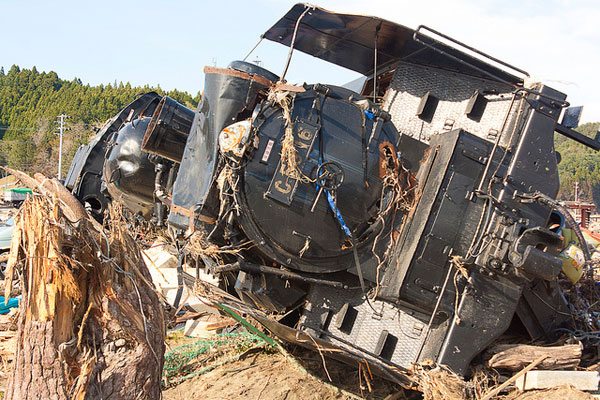
October 3, 2017; Christian Science Monitor
Yesterday, US Environmental Protection Agency (EPA) Administrator Scott Pruitt announced he will be publishing a proposal to rid the country of its pesky rule limiting greenhouse-gas emissions from existing power plants. “The war against coal is over!” he declared. This leaves environmental nonprofits such as the Sierra Club and the Environmental Defense Fund having to refight battles they thought they had won. Of course, advocacy often involves a mix of steps forward and steps back. Unfortunately, in this case, the future of the planet and our lives is literally at stake, since climate change is moving forward apace.
Pruitt as train-wrecker is cast perfectly for his job, having been involved in bringing 14 lawsuits against the EPA before his tenure began. He’s also a proud climate-change denier. Thus, while Obama’s administration introduced the Clean Power Plan to seek to mitigate the negative consequences of carbon emissions, under Scott Pruitt’s leadership, the EPA is not just easing regulations; it’s seeking to reverse its role.
Legal and bureaucratic restrictions constrain, however, so Pruitt has also been making changes that are less visible but harmful nonetheless. Fortunately, when Pruitt and President Trump attempted to cut EPA’s budget by more than 30 percent, Congress rejected the proposal. This may demonstrate that even though Republicans have majorities in both the House and Senate, they are not willing to give Pruitt a free hand.
Still, the fabric of pollution and environmental regulations which protect the health of the population is vulnerable even to the smallest of regressive actions.
“It’s a thousand attacks,” says Scott Slesinger, legislative director for the Natural Resources Defense Council, an environmental nonprofit based in New York. “On everything [Pruitt] does, he’s trying to weaken environmental enforcement, weaken environmental protections, and let industry polluters off the hook.”
This is by no means the first regressive period for the EPA; during President Reagan’s administration, Anne Gorsuch, mother of Supreme Court Justice Neil Gorsuch, slashed EPA’s budget by 21 percent, cut staff by 26 percent, and relaxed regulations and their enforcement, undermining efforts to address the nation’s toxic waste problems. Thousands of toxic sites remain scattered throughout the country.
“They have built on the Reagan-Gorsuch strategy. I wouldn’t be surprised if they kind of studied that,” says Christopher Sellers, an environmental historian at Stony Brook University in New York.
Those who support deregulation and states’ rights believe he is on the right track, despite—or, maybe better said, because of—the experience of the Reagan-era EPA.
“It’s necessary and a lot more than necessary,” says Steven Milloy, a member of Trump’s EPA transition team and author of Scare Pollution: Why and How to Fix the EPA. “We’ve had 45 years of bad science, overregulation, and tyranny by the EPA.” Mr. Milloy argues that many of the regulations are based on biased science and aren’t necessary for public health in the ways proponents claim.
Sign up for our free newsletters
Subscribe to NPQ's newsletters to have our top stories delivered directly to your inbox.
By signing up, you agree to our privacy policy and terms of use, and to receive messages from NPQ and our partners.
Pruitt would like to reverse regulations contained in the Clean Water Rule and the methane rule, in addition to rescinding the Clean Power Plan, but entrenched regulations are not easily reversed. The way they are constructed, new evidence-based guidelines must be ready to take the place of discarded guidelines. This will take a great deal of time. The best he can do is delay implementation of the Obama administration’s rules.
“Some of the things he’ll try to do he won’t be able to get through the courts, but some he will. It will be a mixed bag,” says Daniel Farber, an environmental law professor at the University of California, Berkeley and the coauthor of a recent report looking at the potential consequences of the Trump administration for the environment.
In July, a federal appeals court ruled that not enforcing sections of the methane emissions rule was an “unreasonable” delay and stated the EPA must enforce it.
If the EPA cuts the budget, the agency will have less ability to do the research and monitoring, and could enforce regulations on their own priority list.
“The courts won’t intervene on that,” says Farber. The EPA under former President George W. Bush and Mr. Reagan also tried for regulatory rollback, he notes, somewhat less aggressively than now, and met with legal obstacles. “What turned out to be their strongest weapons were budget and enforcement cuts,” says Farber.
In the meantime, the EPA is losing talent and experience. Steven Cohen, a former EPA staff member and consultant, is the executive director of the Earth Institute at New York’s Columbia University. “A lot of people who are really good are leaving the EPA,” he says. “The best people will find other things people want them to do, and the people who aren’t as good are stuck. That’s a typical human resources story in these kinds of conditions.”
Researchers, including Professor [Christopher] Sellers of Stony Brook University, conducted dozens of interviews of current and former EPA employees for ”The EPA Under Siege,” a report released this summer that examines the agency both historically and in the Trump era. Excerpts of those interviews, in an appendix, reveal a demoralized staff that describes feeling at war with the new political appointees. Along with the effort to undo regulations, the interviewees expressed dismay over what they view as disregard for science at the current EPA, new protocols that favor secrecy over transparency, and the decision to use part of the scant budget for a security team for Pruitt, not something that prior administrators have had. (The EPA did not respond to requests for comment from the Monitor.)
Both sides agree that in environmental oversight, the states are critical. States like California and New York have strong environmental rules and will likely suffer less from Pruitt’s work. The states that do not have the strong rules in place, however, will be hurt.
The unwillingness to keep pace with scientific knowledge and, indeed, the denial of science altogether is perhaps the gravest threat, as it leaves our nation less able to take on the next disaster. “There are places where the impact will be larger than in other places,” says the Earth Institute’s Cohen. Environmental laws that are currently in place will help us survive the Pruitt era.
“I think we have enough safeguards,” says Cohen. “The danger is that instead of advancing as we need to keep pace with the technologies we’re introducing, we’ll be running as hard as we can to keep still.”—Marian Conway













